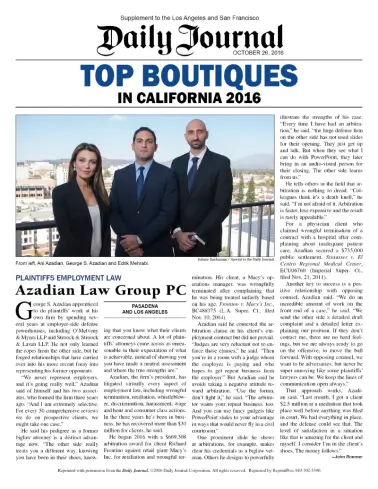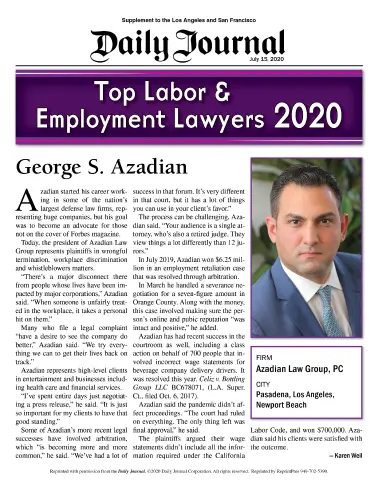Wrongful Termination in California: Statute of Limitations
Wrongful termination occurs whenever an employer fires an employee illegally. While the at-will employment law of California generally provides expansive flexibility for employers when it comes to hiring and firing employees, employers may not violate employment contracts, nor may they fire employees for reasons that are illegal. The Equal Employment Opportunity Commission (EEOC) and various other agencies at the federal and state levels enforce strict rules pertaining to employment in California, and everyone working in California must understand these laws.

What Is Wrongful Termination?
When an employee is fired, it is easy for them to feel that the system is working against them, especially if they believe their termination wasn’t justified. The at-will employment law of California generally allows companies to fire employees whenever they wish, for any reason or no reason at all. However, they may not fire employees for discriminatory reasons. Some of the most commonly reported types of discrimination that lead to wrongful termination claims in the US include:
- Racial discrimination. Employers may not fire employees based on race, national origin, skin color, or ethnicity.
- Religious discrimination. Employers may not base hiring or firing decisions on religious belief or the exercise of religious practices.
- Medical discrimination. Employers may not discriminate against employees who have disabilities or are perceived as disabled. In addition, the Americans with Disabilities Act (ADA) provides further protection for disabled employees beyond what the EEOC enforces.
- Sex discrimination. It is not legal for companies to fire employees based on sex or sexual orientation. Additionally, employers may not discriminate against pregnant women or fire them when they request parental leave. Employers also may not fire employees who make internal reports of sexual harassment in the workplace or file EEOC claims pertaining to sexual harassment.
- Retaliatory discrimination. Employers may not fire employees for taking legally protected actions. Examples include whistleblowing to oversight agencies to report workplace safety violations and regulatory noncompliance, testifying in court cases involving employers, or seeking workers’ compensation benefits or unpaid leave under the Family and Medical Leave Act (FMLA) or the California Family Rights Act (CFRA).
Employers may commit wrongful terminations in several ways, and affected employees may feel legally stuck due to the state’s at-will employment law. When employers engage in wrongful terminations, they often attempt to disguise the true intentions behind their firing decisions and leverage the at-will employment statute to shield themselves from legal recourse.
Potential Compensation for Wrongful Termination
If you believe you were wrongfully terminated from your job for any reason, it’s vital to consult a lawyer right away to start building your case. It’s often difficult to obtain the evidence you will need to substantiate a wrongful termination claim, but your legal team can help you determine the best approach to building your case.
A successful wrongful termination claim can yield several types of compensation for the plaintiff. They can seek back pay for the income and benefits they should have earned and compensation for the emotional distress they experienced. In addition, depending on the scope of the employer’s behavior, the EEOC may pursue criminal penalties on the employee’s behalf. They may fine the employer, and the employer could face punitive damages based on the severity of the illegal actions taken against the employee.
What Is a Statute of Limitations?
A statute of limitations is the legal time limit in which a plaintiff has to file their case. Every state upholds laws governing the statutes of limitations for distinct types of claims. For example, in California, the wrongful termination statute of limitations is two years from the date of the employee’s termination. This means if you were wrongfully terminated on January 1, 2022, you would have until January 1, 2024, to file your wrongful termination suit.
This may seem like plenty of time to file your case, but the reality is that wrongful termination cases are often challenging to build. Therefore, the sooner you secure legal counsel, the better your chances of succeeding with the claim.
FAQs
Q: How Long After a Wrongful Termination Can You Sue?
A: California’s statute of limitations for wrongful termination claims is two years. You have two years from the date of your termination to file a wrongful termination case. However, you must file a claim with the EEOC within 180 days of your firing to proceed with a civil claim against your employer. Your attorney can help you meet this deadline and proceed with a civil case within the two-year statute of limitations.
Q: How Do I Sue a Company for Wrongful Termination in California?
A: The EEOC must investigate and approve all wrongful termination claims before employees may proceed with their claims. Your attorney can help you file a claim with the EEOC, and once the EEOC determines your termination was wrongful, they will issue you a Notice of Right to Sue. This legal document allows you to proceed with a civil claim for damages against your employer.
Q: What Is Considered Wrongful Termination in California?
A: A wrongful termination is any termination that breaches an employment contract or violates the anti-discrimination laws of the United States. Wrongful termination can also occur as retaliation for legally protected actions, such as seeking unpaid leave through the FMLA or filing a workers’ compensation claim after an injury on the job.
Q: How Much Is a Wrongful Termination Lawsuit Worth in California?
A: An experienced attorney will help their client determine the potential value of their wrongful termination claim. The employee can typically expect to recover compensation for lost income and benefits and non-economic damages for infliction of emotional distress. They may also qualify to receive punitive damages depending on the severity of the employer’s behavior.
If you believe your recent termination was wrongful, you probably have many questions about your situation and need to secure legal counsel as soon as possible. The Azadian Law Group, PC, can provide the comprehensive legal representation you need to navigate the EEOC claim process and file a civil claim against your employer. If you are ready to speak with an attorney about your wrongful termination case, contact us today and schedule a consultation.
Related Blog Posts
Hollywood headlines are buzzing again—but this time, it's not about a blockbuster premiere. On June 3, 2025, a Los Angeles...
Read MoreSomething unexpected hit the news cycle in March 2025—and it’s got a lot of people talking. A man named Christopher...
Read MoreImagine dedicating years of your life to a mission-driven organization, only to be pushed out the moment you raise concerns....
Read MoreTypes of Cases Handle By Employment Lawyers in Los Angeles, CA
The following presents an overview of the broad range of employment law cases that our employment attorneys are experienced at overseeing and favorably resolving.
Wrongful Termination
Wrongful Termination Lawyers in Los Angeles, CA Attorneys at Azadian Law Group who have filed wrongful termination lawsuits acknowledge that unfair termination can significantly impact an employee’s life. It can…
Age Discrimination
Age Discrimination Lawyers in Los Angeles, CA Azadian Law Group, PC regularly represents clients throughout Los Angeles, CA, who are the victims of age discrimination in the workplace. At Azadian…
Pregnancy Discrimination
Pregnancy Discrimination Lawyer in Los Angeles, CA At Azadian Law Group, PC, our pregnancy discrimination lawyer in Los Angeles, regularly represents clients who are the victims of pregnancy discrimination in…
Sexual Harassment
Sexual Harassment Attorney in Los Angeles, CA The Los Angeles Sexual Harassment Lawyers at Azadian Law Group, PC, know that in today’s modern era, some people often make the mistake of…
Racial Discrimination
Racial Discrimination Lawyers in Los Angeles, CA Azadian Law Group, PC regularly represents clients throughout Los Angeles who are the victims of racial discrimination at work. The Los Angeles Race…
Disability Discrimination
Disability Discrimination Attorneys in Los Angeles, CA There is a misconception that disabled people do not want to work or that disabled individuals simply cannot or will not be as…
Praise from Our Clients
Who We Represent
At Azadian Law Group, we are dedicated to upholding the rights and interests of employees in the workplace. Our expertise in employment law positions us as staunch advocates for those facing unjust treatment in their professional environments.
Whether combating workplace discrimination, addressing unfair termination, or negotiating equitable compensation, our team is committed to ensuring that every employee we represent is treated fairly and respectfully under the law.

Step 1
Explore our comprehensive range of legal services to find the specialized support you need.
Step 2
Arrange a free initial meeting with our experts to discuss your legal situation.
Step 3
Receive a custom strategy specially created for your case by our legal experts.
Call Us Now 213-229-9031
Tell Us Your Story
Speak out for justice. Your story can be the start of a new chapter of workplace fairness.




